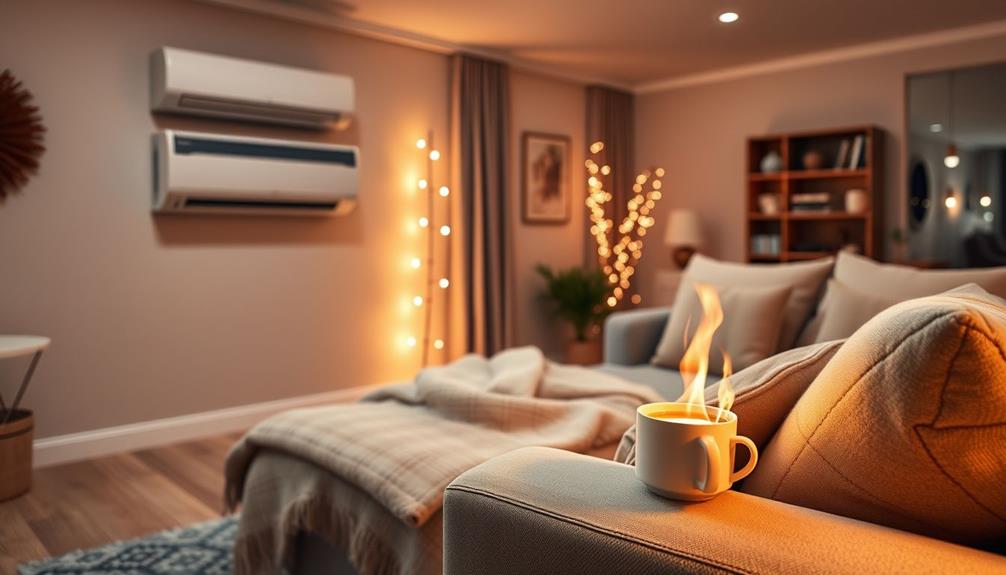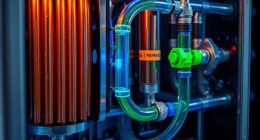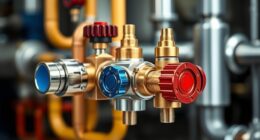Hello everyone, we would like to showcase the amazing world of energy-efficient heat pump systems. These innovative devices not only keep our homes cozy and welcoming, but also help cut down on our energy bills.
Join us as we dive into the ins and outs of these efficient systems, uncovering their benefits, tricks to maximize efficiency, and troubleshooting tips.
Get ready to embark on a journey towards a more sustainable and cost-effective home heating solution.
Key Takeaways
- Heat pump systems transfer heat from one area to another, providing both heating and cooling for year-round comfort.
- Regular maintenance, insulation, and programmable thermostats are crucial for maximizing energy efficiency.
- SEER and HSPF are common rating systems used to understand the efficiency of heat pumps.
- Energy-efficient heat pump systems reduce monthly energy bills and are a responsible choice for the environment.
The Basics of Energy-Efficient Heat Pump Systems
We will explain the key components and operation of energy-efficient heat pump systems.

Heat pump systems are a popular choice for maintaining comfortable indoor temperatures while minimizing energy consumption.
The installation of a heat pump involves the placement of both an indoor and outdoor unit. The indoor unit contains the evaporator coil, while the outdoor unit houses the compressor and condenser coil.
These components work together to transfer heat from one area to another. During cold weather, the heat pump extracts heat from the outdoor air and transfers it inside, providing warmth. In warmer months, the process is reversed, and the heat pump removes heat from indoors and releases it outdoors.
Regular maintenance is essential for optimal performance, including cleaning or replacing filters, inspecting electrical connections, and ensuring proper refrigerant levels. Following these maintenance practices will ensure the longevity and efficiency of your heat pump system.

Understanding Heat Pump Efficiency Ratings
Let’s now turn our attention to understanding heat pump efficiency ratings.
There are several factors that affect the efficiency of a heat pump system, such as the size, insulation, and climate of the home.
Additionally, it’s important to compare different rating systems, such as SEER (Seasonal Energy Efficiency Ratio) and HSPF (Heating Seasonal Performance Factor), to ensure you’re selecting the most energy-efficient option for your home.
Factors Affecting Efficiency
One of the key factors that affect the efficiency of heat pump systems is the understanding of heat pump efficiency ratings. By comprehending these ratings, homeowners can identify the factors that impact the performance of their heat pumps and take steps to improve their efficiency.
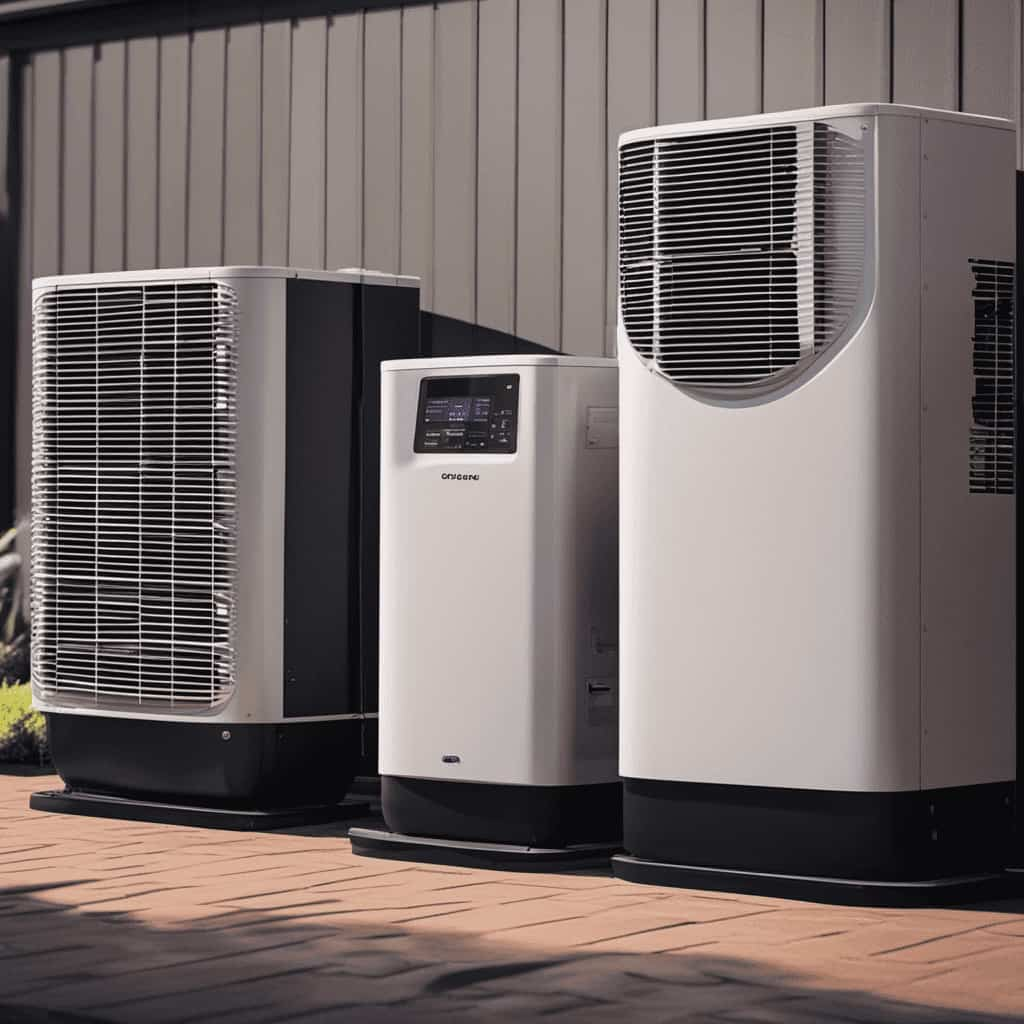
There are several factors that influence the efficiency of heat pumps, including the size and design of the system, the quality of the installation, and the maintenance and upkeep of the equipment. Additionally, the climate and weather conditions in which the heat pump operates can also affect its efficiency.
By considering these factors and implementing measures such as regular maintenance, proper insulation, and using programmable thermostats, homeowners can maximize their heat pump’s efficiency and reduce energy consumption. Understanding these factors is essential for homeowners to make informed decisions and optimize their heat pump systems.
In the subsequent section, we’ll compare different rating systems to further enhance our understanding of heat pump efficiency.
Comparing Different Rating Systems
To understand heat pump efficiency ratings, we’ll compare different rating systems.
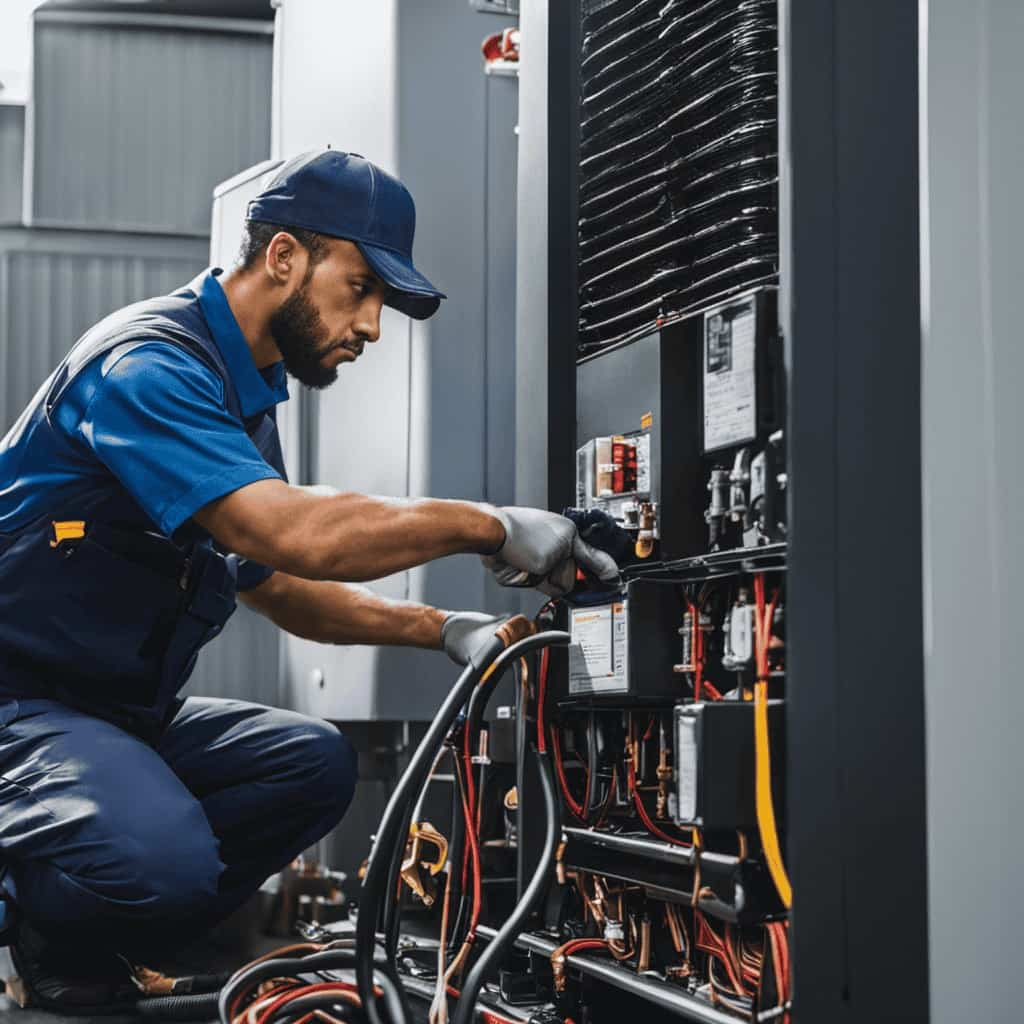
When it comes to rating systems, there are a few commonly used ones that can help homeowners make informed decisions about energy-efficient heat pump systems.
One of the most well-known rating systems is the Seasonal Energy Efficiency Ratio (SEER). SEER measures the cooling efficiency of heat pumps and air conditioners.
Another rating system is the Heating Seasonal Performance Factor (HSPF), which measures the heating efficiency of heat pumps.
Additionally, there’s the Energy Efficiency Ratio (EER), which focuses on the cooling efficiency of heat pumps at a specific outdoor temperature.

Benefits of Energy-Efficient Heat Pump Systems
Using energy-efficient heat pump systems can significantly reduce our monthly energy bills while also minimizing our carbon footprint. These systems are designed to transfer heat from one place to another, rather than generate heat through combustion, making them highly efficient.
By utilizing the heat from the air, ground, or water, heat pumps can provide both heating and cooling to our homes, ensuring year-round comfort. The cost savings associated with energy-efficient heat pump systems are substantial, as they require less energy to operate compared to traditional heating and cooling systems.
Additionally, by reducing our energy consumption, we can reduce our impact on the environment, helping to mitigate climate change and preserve our planet for future generations. Investing in energy-efficient heat pump systems isn’t only a smart financial decision but also a responsible choice for the environment.
How Heat Pumps Save Energy and Reduce Costs
We can maximize energy savings and minimize costs by utilizing heat pumps in our homes. Heat pump technology offers various energy-saving features that make them an efficient and cost-effective choice for heating and cooling our living spaces. Here are some key ways in which heat pumps save energy and reduce costs:

| Energy-Saving Features | Benefits |
|---|---|
| Dual-Functionality | Heat pumps can both heat and cool our homes, eliminating the need for separate heating and cooling systems, which saves energy and reduces costs. |
| High Energy Efficiency | Heat pumps are designed to transfer heat rather than generate it, making them more energy-efficient than traditional heating systems. This results in lower energy consumption and reduced utility bills. |
| Smart Thermostat Integration | Many heat pumps come with smart thermostat compatibility, allowing us to easily control and optimize the temperature settings for maximum energy efficiency. |
| Zoning Capabilities | Heat pumps can be installed with zoning capabilities, enabling us to heat or cool specific areas of our homes, reducing energy waste in unused spaces. |
| Renewable Energy Compatibility | Heat pumps can be powered by renewable energy sources such as solar or geothermal, further reducing reliance on fossil fuels and saving on energy costs. |
Choosing the Right Size Heat Pump for Your Home
When it comes to choosing the right size heat pump for our homes, proper sizing is crucial. A heat pump that’s too small may struggle to meet our heating requirements, while one that’s too large may cycle on and off frequently, leading to inefficiency and increased costs.
To ensure optimal efficiency and cost-effectiveness, it’s important to accurately assess our home’s heating needs and select a heat pump that’s the right size for our specific requirements.
Proper Heat Pump Sizing
Choosing the appropriate size heat pump for our home is crucial for optimal energy efficiency and comfort. When it comes to heat pump installation, it’s important to remember that selecting the right size isn’t just about the physical dimensions, but also about its heating and cooling capacity.
A heat pump that’s too small will struggle to adequately heat or cool your home, leading to discomfort and increased energy consumption. On the other hand, a heat pump that’s too large will cycle on and off frequently, resulting in inefficient operation and higher energy bills.

To ensure proper heat pump sizing, it’s recommended to consult with a professional HVAC technician who can perform a detailed analysis of your home’s heating and cooling needs.
Additionally, regular heat pump maintenance is crucial to keep it operating efficiently and to extend its lifespan.
Efficiency and Cost
How can we ensure that the heat pump we choose for our home is the right size in terms of efficiency and cost?
When it comes to selecting a heat pump, finding the right size is crucial for maximizing both efficiency and cost savings. An improperly sized heat pump can result in higher energy bills and decreased system performance.

To make an informed decision, consider factors such as the size of your home, insulation levels, and climate conditions. It’s also important to consult with a professional HVAC contractor who can perform a load calculation to determine the appropriate size for your specific needs.
Additionally, take advantage of energy efficient heat pump rebates offered by utility companies or government programs, which can help offset the initial cost of the system. While the upfront cost may be higher, the long-term savings from an appropriately sized heat pump will outweigh the initial investment.
As we delve into the next section about home heating requirements, we’ll explore the different factors to consider in order to ensure optimal performance and efficiency.
Home Heating Requirements
As homeowners, we need to consider the home heating requirements in order to select the right size heat pump for our homes.

One important factor to consider is the level of home insulation. Good insulation helps to keep heat inside the house, reducing the workload on the heat pump. Insulation can be improved by adding insulation material to walls, roofs, and floors.
Another way to optimize heating efficiency is by following energy-saving tips. For example, keeping windows and doors closed when the heat pump is running helps to prevent warm air from escaping. Additionally, using curtains or blinds can provide extra insulation.
Exploring Different Types of Heat Pump Systems
Let’s dive into the different types of heat pump systems available for homes. Here are four options to consider:
-
Air source heat pumps: These systems extract heat from the outdoor air and transfer it indoors. They’re easy to install and cost-effective, making them a popular choice for residential applications.

-
Ground source heat pumps: Also known as geothermal heat pumps, these systems use the stable temperature of the ground to heat or cool your home. While they require more upfront investment and installation considerations, they offer higher efficiency and long-term savings.
-
Water source heat pumps: These systems extract heat from a water source, such as a lake or a well, to provide heating and cooling. They’re ideal for homes located near a water source and can be highly efficient.
-
Hybrid heat pumps: Combining a heat pump with a traditional furnace or boiler, hybrid systems offer the flexibility to switch between different heat sources depending on outdoor temperatures. This ensures optimal comfort and energy efficiency year-round.
Considering the different heat sources and installation considerations, you can choose the heat pump system that best suits your home’s needs.
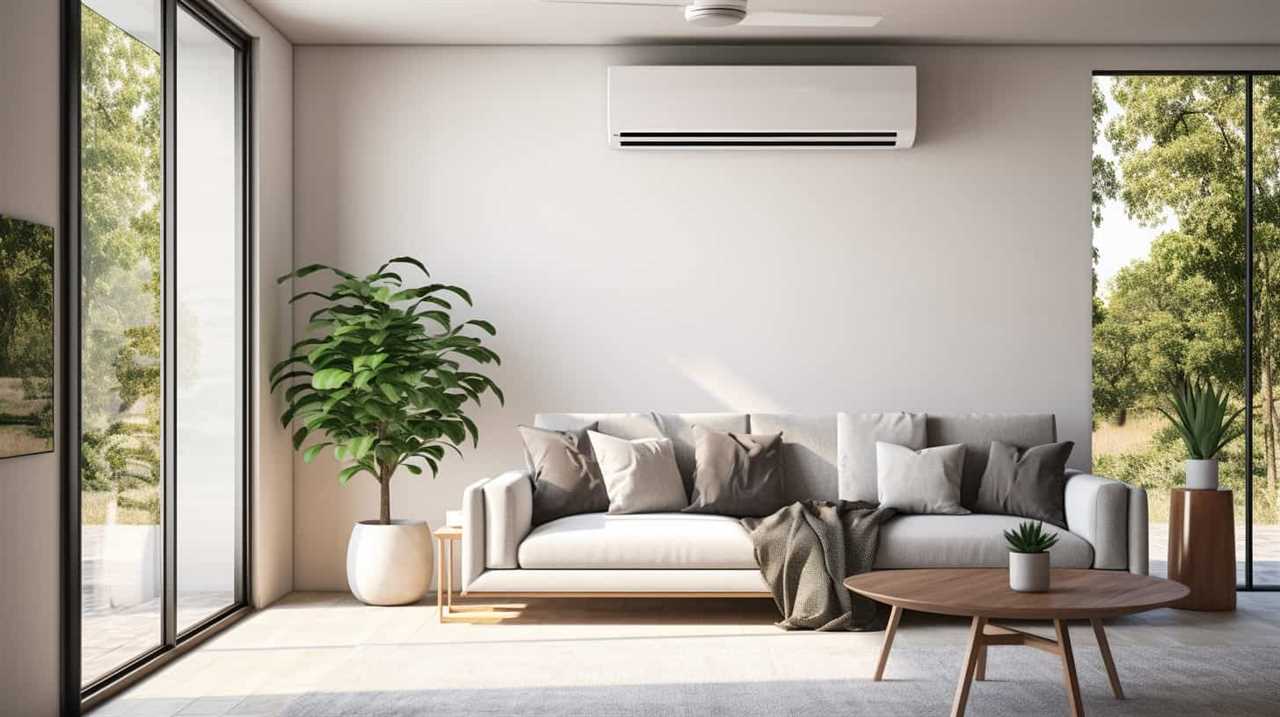
Maximizing Energy Efficiency With Heat Pump Controls
When it comes to maximizing energy efficiency with heat pump controls, there are two key points to consider.
First, optimal temperature control plays a crucial role in reducing energy consumption. By setting the temperature at an appropriate level and avoiding extreme fluctuations, homeowners can ensure efficient operation.
Second, energy-saving programmable settings allow users to customize their heat pump’s operation according to their daily schedule, ensuring that energy isn’t wasted when no one is home.
Optimal Temperature Control
How can we maximize energy efficiency with heat pump controls by achieving optimal temperature control? Here are four key factors to consider:

-
Set the temperature wisely: Adjusting the thermostat to an appropriate temperature can have a significant impact on energy consumption. Consider setting your heat pump to a comfortable yet efficient temperature, such as 68°F or lower in winter and 78°F or higher in summer.
-
Utilize programmable thermostats: Take advantage of programmable thermostats to create temperature schedules that align with your daily routine. This allows you to reduce energy usage when you’re away from home or sleeping, while still maintaining a comfortable environment when needed.
-
Zone heating and cooling: Divide your home into zones and install multiple thermostats to control the temperature in each area independently. This way, you can prioritize heating or cooling only the spaces that are occupied, saving energy in unoccupied areas.
-
Regular maintenance: Ensure that your heat pump is properly maintained to optimize its performance and efficiency. Regularly clean or replace air filters, check ductwork for leaks, and schedule professional inspections to identify any potential issues that may impact temperature regulation and energy consumption.

Energy-Saving Programmable Settings
To maximize energy efficiency with heat pump controls, we can utilize energy-saving programmable settings. These settings allow you to customize your heat pump’s operation based on your schedule and preferences, saving you energy and money.
Energy-saving thermostat features, such as programmable temperature settings, enable you to set different temperatures for different times of the day. For example, you can lower the temperature during the night or when you’re away from home.
Additionally, some heat pumps offer smart home integration, allowing you to control your system remotely through your smartphone or voice commands. This feature ensures that your heat pump operates efficiently, even when you’re not at home.
By taking advantage of these energy-saving programmable settings, you can optimize your heat pump’s performance and reduce your energy consumption.

Now that we’ve discussed how to maximize energy efficiency with heat pump controls, let’s explore the importance of maintaining and servicing your energy-efficient heat pump.
Maintaining and Servicing Your Energy-Efficient Heat Pump
We are responsible for regularly scheduling maintenance and servicing of our energy-efficient heat pump system. Proper heat pump maintenance and servicing are essential to ensure optimal performance, energy efficiency, and longevity of the system.
Here are four important steps to consider:
-
Schedule annual professional maintenance: Regular maintenance by a qualified technician helps identify and address any potential issues before they become major problems. This includes checking refrigerant levels, cleaning coils, and inspecting electrical connections.

-
Clean or replace filters regularly: Dirty filters can restrict airflow and reduce the heat pump’s efficiency. Clean or replace filters every 1-3 months, depending on usage, to maintain optimal airflow and indoor air quality.
-
Keep outdoor unit clear: Clear any debris, leaves, or obstructions around the outdoor unit to maintain proper airflow and prevent overheating.
-
Monitor and address any unusual noises or performance issues: If you notice strange noises, reduced heating or cooling capacity, or any other performance issues, contact a professional for inspection and necessary repairs.
Common Issues and Troubleshooting for Heat Pump Systems
Sometimes, heat pump systems may experience common issues and troubleshooting is necessary to resolve them effectively. To help you tackle these problems, here are some troubleshooting tips for common maintenance issues you may encounter with your heat pump system.

-
Insufficient heating or cooling: Check your thermostat settings to ensure they’re correct. If the temperature is still not comfortable, clean or replace the air filters. Clogged filters can restrict airflow and reduce efficiency.
-
Noisy operation: If your heat pump system is making unusual noises, it could be due to loose or worn-out parts. Inspect the fan blades, motor, and belts for any signs of damage or wear. Tighten or replace them as needed.
-
Frequent cycling: If your heat pump system is turning on and off frequently, it may be due to a faulty thermostat or improper refrigerant charge. Contact a professional to diagnose and address these issues.
Upgrading to an Energy-Efficient Heat Pump: What to Consider
One important factor to consider when upgrading to an energy-efficient heat pump is the size of your home. Properly sizing your heat pump is crucial to ensure optimal performance and energy efficiency. Here are four key considerations to keep in mind:

-
Heat load calculation: A professional heat pump installation technician can conduct a heat load calculation to determine the heating and cooling requirements of your home. This calculation takes into account factors such as insulation, windows, and square footage to determine the appropriate size of the heat pump.
-
Energy efficiency rating: Look for heat pumps with high energy efficiency ratings, such as SEER (Seasonal Energy Efficiency Ratio) and HSPF (Heating Seasonal Performance Factor). Higher ratings indicate better energy efficiency and can result in significant energy savings over time.
-
Ductwork evaluation: Before upgrading to a new heat pump, have your ductwork inspected. Leaky or poorly insulated ducts can result in energy loss, reducing the overall efficiency of your HVAC system. Consider sealing and insulating ducts to improve energy efficiency.
-
Additional features: Consider additional features that can enhance energy efficiency, such as variable speed motors, programmable thermostats, and zoning systems. These features allow for better control over heating and cooling, reducing energy waste.

Frequently Asked Questions
How Much Does an Energy-Efficient Heat Pump System Cost?
Energy-efficient heat pump systems can vary in cost depending on factors such as size and brand. However, investing in these energy-saving options can provide long-term benefits, including lower energy bills and reduced environmental impact.
Are There Any Government Incentives or Rebates Available for Installing Energy-Efficient Heat Pump Systems?
Yes, there are government incentives and rebates available for installing energy-efficient heat pump systems. These financial incentives, provided through government initiatives, can help offset the cost of installation and make it more affordable for homeowners.
Can an Energy-Efficient Heat Pump System Be Used for Both Heating and Cooling?
Yes, an energy-efficient heat pump system can be used for both heating and cooling. It offers advantages such as lower energy consumption and cost savings, but drawbacks include higher upfront costs and the need for regular maintenance.
How Long Does the Installation Process Typically Take for an Energy-Efficient Heat Pump System?
The installation process for an energy-efficient heat pump system is surprisingly quick. In just a fraction of the time it takes to watch a movie, you’ll have a new system that will save you money and keep you comfortable all year round.
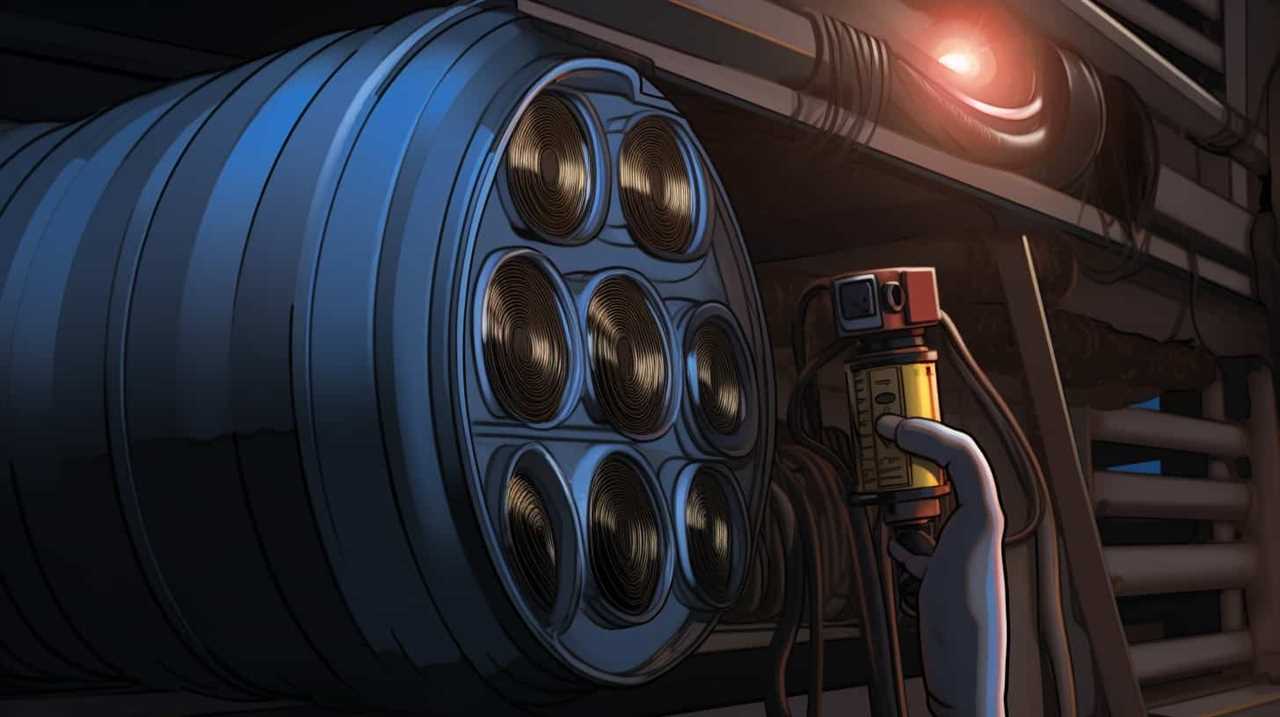
Are There Any Specific Maintenance Tasks That Homeowners Need to Perform on Their Energy-Efficient Heat Pump Systems?
Homeowners have specific maintenance tasks for their energy-efficient heat pump systems. We need to regularly clean or replace air filters, inspect outdoor units, and schedule professional tune-ups to ensure optimal performance and energy efficiency.
Conclusion
In conclusion, energy-efficient heat pump systems are a smart choice for homeowners looking to save energy and reduce costs.
With their high efficiency ratings and advanced controls, these systems provide optimal heating and cooling while minimizing energy consumption.
By considering the size of the heat pump and regular maintenance, homeowners can maximize energy efficiency and enjoy the benefits of a comfortable home environment.

So why wait? Upgrade to an energy-efficient heat pump and start saving today!



